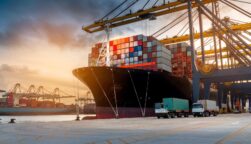A US federal court has blocked many of President Trump’s new tariffs. The court has issued an injunction on the executive orders that enacted these tariffs — and a trade war — that will stop any operations related to the tariff orders immediately.
The Court of International Trade has stated that the president has overstepped his powers, as he used the International Emergency Economic Powers Act (IEEPA) to justify his original actions. However, this Act doesn’t necessarily state that tariffs can be enacted as a result of its imposition.
While the announcement has caused some relief, it’s unlikely that any revoking of the tariffs will fix the damage done to the logistics industry in the past few months. Likewise, experts have warned that there are other ways that the White House can continue with their tariff operation.
US Federal Court Blocks President Trump’s Industry-Changing Tariffs
The US Court of International Trade has blocked most of President Trump’s new tariffs in a sweeping decision on Wednesday.
The Court issued an injunction on four executive orders, which had invoked various national emergencies, to enable tariffs on Canada, China and Mexico — and a 10% global baseline tariff and additional reciprocal tariffs. The injunction calls on the government to stop any tariff-related operations immediately and to issue administrative notices on the injunction within 10 days.
 This just in! View
This just in! View
the top business tech deals for 2026 👨💻
This has come as a result of small businesses and several US states filing petitions to halt the tariffs. When imposing the tariffs, Trump did so via IEEPA. However, these small businesses and US states have claimed putting these tariffs in place through this act oversteps presidential powers.
This caused the court to side with the plaintiffs and block the executive orders that imposed the tariffs as a result.
Lawyers of the Trump administration have already appealed the decision to the US Court of Appeals for the Federal Circuit, and now have 14 days to file additional documents supporting their case.
President Has Overstepped His Authority, Says Court of International Trade
Kush Desai, a spokesperson for the White House, has issued a statement saying: “It is not for unelected judges to decide how to properly address a national emergency.”
Trump originally set out with his tariffs on April 2nd, which saw a baseline 10% tariff on all US imports. He has since announced several more troubling figures, including an eye watering 145% US tax on Chinese imports. Recently, the President has also threatened a 50% tariff from June on all EU goods.
Trump is not the first US president to enact emergency tariffs. Richard Nixon did the same thing in 1971, imposing a 10% global tariff to address a national emergency related to the US economic position. While Trump has also invoked a national emergency — immigration crises, fentanyl trafficking, and disproportionate trade relationships — the law Nixon used is now represented by the IEEPA.
Where Trump has been caught out is in his imposition under this Act, which states a president may “regulate” international economic transactions, but doesn’t explicitly state tariffs can be imposed.
What Could Tariff Ruling Mean for the Logistics Industry?
In recent months, the news on tariffs hasn’t seemed to be going in any positive direction, despite a 90-day pause on tariffs earlier this month. This new development will contribute to the sense of uncertainty in regard to international trading, and will throw ongoing trade talks between the US and other countries into further unpredictability.
If the ruling is upheld, businesses who have had to pay tariffs will receive refunds on the amounts paid, including on any reciprocal tariffs, with interest included. While this may be a good shift for some, a lot of the damage has already been done, particularly for those in logistics.
Up-and-down freight volumes at ports could have already damaged the trucking industry, and The American Trucking Association has warned that tariffs could inflate the price of a new truck by $35,000.
Experts have pointed out that there are other avenues that Trump could use to impose his tariffs, also. Analyst Alec Phillips has stated that while the ruling represents a setback for the Trump administration, it “might not change the final outcome for most major US trading partners.”




